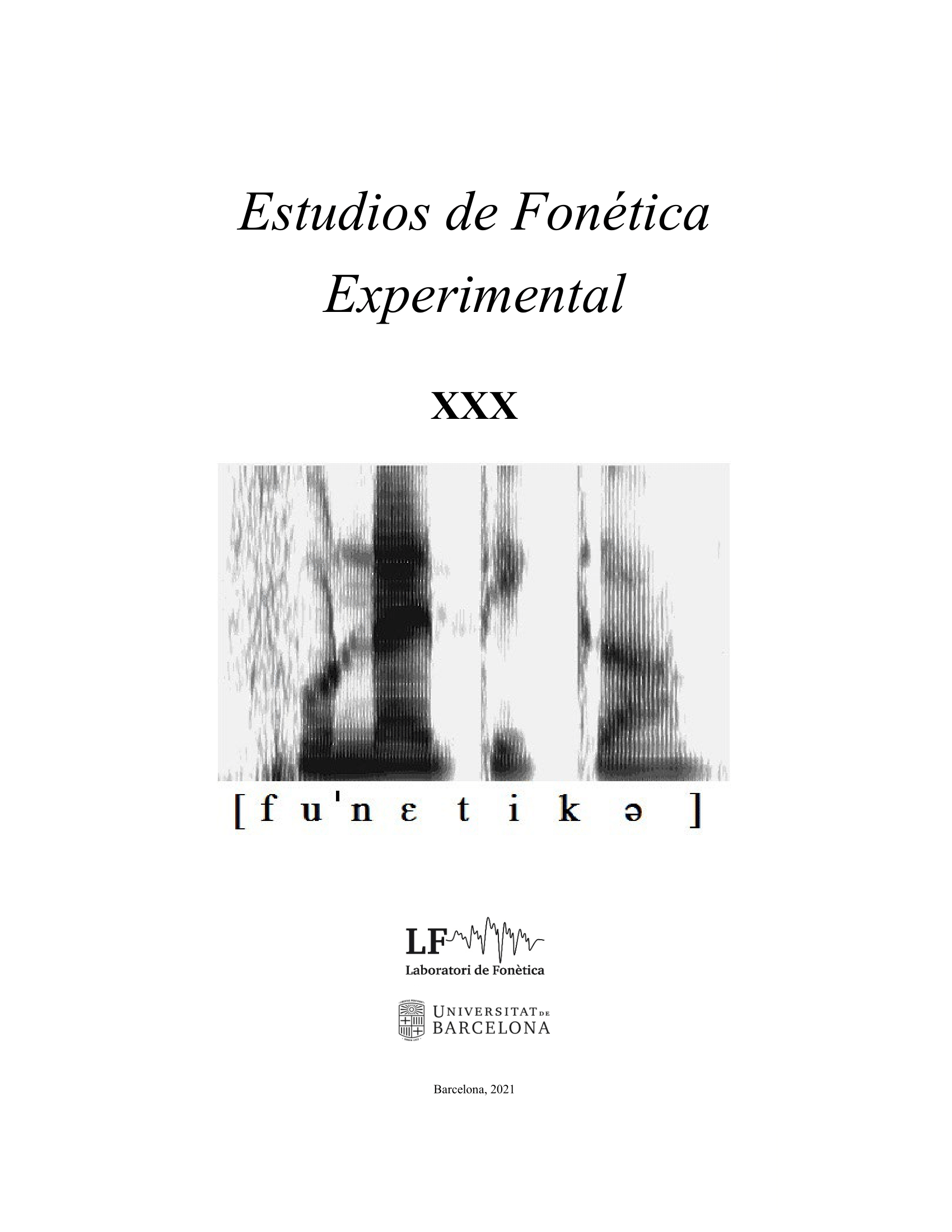The elision of the implosive /s/ in bilingual speakers of Mallorca
Keywords:
Elision, Implosive /s/, Phonological context, Position in the word, Grammatical functionAbstract
The elision of the implosive /s/ in some varieties of Spanish has aroused great interest in the phonetic-phonological field. However, the elision of /s/ in the northern varieties is a field little worked, especially in the speech of the bilingual areas. This paper aims to study the possible elision of the implosive /s/ in bilingual Majorcan speakers. The initial hypothesis is that /s/ will be elided and the frequency of the elision will be related to the phonological context. The results obtained indicate that elision does take place. Likewise, it has been found that contact of /s/ with an adjacent nasal consonants and final position are factors that favour the elision of /s/. However, the grammatical function of /s/ does not affect this elision.
References
BIRDSONG, D., GERTKEN, L. M. y AMENGUAL, M. (2012): Bilingual Language Profile: An Easy-to-Use Instrument to Assess Bilingualism. COERLL, University of Texas at Austin.
CEPEDA, G. y POBLETE BENNETT, M. T. (1992): «El condicionamiento morfológico de “s” como marcador de plural en el SN», Revista de lingüística teórica y aplicada, 30, pp. 119-138 .
HIDALGO NAVARRO, A. y QUILIS MERÍN, M. (2012): La voz del lenguaje: Fonética y fonología del español, Valencia, Tirant Humanidades.
HUALDE, J. I. (2014): Los sonidos del español, Nueva York, Cambridge University.
LADEFOGED, P. y I. MADDIESON (1996): The Sounds of the World’s Languages, Oxford, Blackwell.
MARTÍNEZ CELDRÁN, E. y FERNÁNDEZ PLANAS, A. M. (2007): Manual de fonética española. Articulaciones y sonidos del español, Barcelona, Ariel.
MOLL, F. (1961): «El castellano en Mallorca». En Studia Philologica; Homenaje ofrecido a Dámaso Alonso por sus amigos y discípulos con ocasión de su 60º aniversario, Madrid, Gredos, Vol. 2, pp. 469-474.
OHALA, J. J. y SOLÉ, M. (2008): «Turbulence and Phonology », UC Berkeley Lab Annual Report, 4, pp. 297-355.
ORTIZ LIRA, H. y MENA FLORES, L. (2015): «Alofonía del fonema fricativo alvéolo-dental /s/ en posición codal preconsonántica en el habla de profesionales de Santiago», Boletín de Filología, 2, pp. 123-148.
PENNY, R. (2000, 2004). Variación y cambio en español, Madrid, Gredos.
PÉREZ MARTÍN, A. M. y TROYA DÉNIZ, M. (2012): «Frecuencia de los formantes de las vocales medias en sílaba final de palabra con elisión de -/s/: Un estudio con materiales de la norma culta de Las Palmas de Gran Canaria», Revista de Filología de la Universidad de las Palmas de Gran Canaria, 18-19, pp. 99-113.
QUILIS, A. (1993, 1999): Tratado de fonología y fonética españolas, Madrid, Gredos.
RAE-ASALE (2011): Nueva gramática de la lengua española: fonética y fonología, Madrid.
RECASENS I VIVES, D. (2014): Fonètica i fonologia experimentals del català. Vocals i consonants, Barcelona, Institut d’Estudis Catalans.
ROMERA, M. (2003): «La variedad del castellano actual en Baleares», Moenia, 9, pp. 359-381.
SAMPER PADILLA, J. A. (1987): «La elisión de -/s/ final en la FN y recursos desambiguadores en el español de Las Palmas de Gran Canaria», Revista de Filología, Universidad de La Laguna, 6 y 7, pp. 407-424.
SERRANO VÁZQUEZ, M. C. (1996): «Rasgos fonéticos del carácter interferencial en el castellano de una comunidad bilingüe», E.L.U.A., 11, pp. 365-383.
TERRELL, T. D. (1978): «La aspiración y elisión de /s/ en el español porteño», Anuario de Letras: Lingüística y filología, 16, pp. 41-66.
Downloads
Published
How to Cite
Issue
Section
License

This work is licensed under a Creative Commons Attribution-NonCommercial-NoDerivatives 4.0 International License.
All articles published online by Estudios de Fonética Experimental are licensed under Creative Commons Attribution-NonCommercial-NoDerivs 4.0 International (CC BY-NC-ND 4.0 DEED), unless otherwise noted. Estudios de Fonética Experimental is an open access journal. Estudios de Fonética Experimental is hosted by RCUB (Revistes Científiques de la Universitat de Barcelona), powered by Open Journal Systems (OJS) software. The copyright is not transferred to the journal: authors hold the copyright and publishing rights without restrictions. The author is free to use and distribute pre and post-prints versions of his/her article. However, preprint versions are regarded as a work-in-progress version used as internal communication with the authors, and we prefer to share postprint versions.




